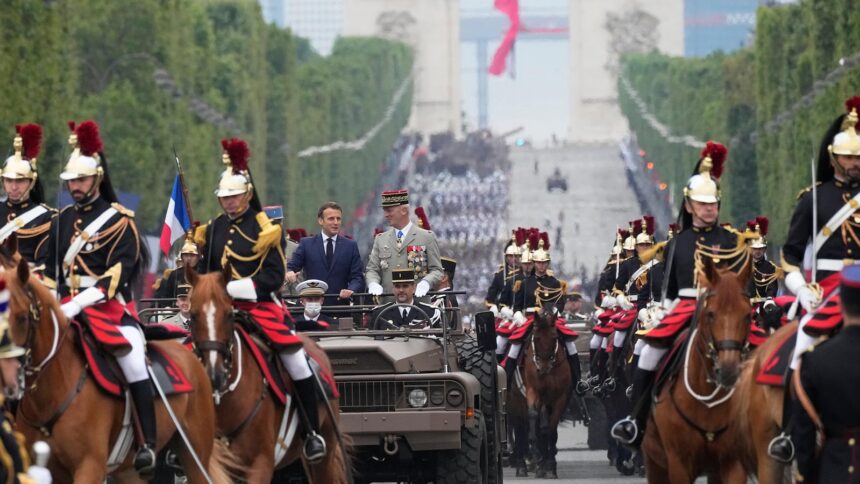PARIS — French President Emmanuel Macron may awake — if he has slept in any respect — with clipped wings on Monday morning.
The high-stakes second spherical of the legislative election on Sunday will virtually definitely impression the French chief’s sway within the areas of protection and international affairs. It may diminish his function as an lively and influential determine in European and world affairs and as one among Ukraine’s main backers within the warfare towards Russia, say retired French army officers and analysts of France’s protection and international insurance policies.
After the centrist president’s bloc completed a distant third, behind the surging far proper, in final weekend’s first spherical of voting for a brand new parliament, one of many solely certainties earlier than Sunday’s decisive spherical two is that Macron himself cannot emerge strengthened.
With a lot of its candidates already out of the race, Macron’s camp cannot safe absolutely the majority that gave him ample maneuvering room in his first time period as president from 2017. It is also more likely to fall properly wanting the 245 seats it gained after his reelection in 2022. That made it the biggest single group — albeit and not using a clear majority — within the outgoing Nationwide Meeting that Macron dissolved on June 9, triggering the shock election after the far proper handed his alliance a painful beating in French voting for the European Parliament.
That leaves two outcomes most definitely to emerge on Sunday evening to Monday as official outcomes are available.
In a single state of affairs, France may find yourself with a fragmented parliament and a first-rate minister too weak to noticeably undermine Macron’s constitutionally assured function as head of the armed forces and, extra broadly, unable or unwilling to majorly problem his protection and foreign-policy powers. Nonetheless, even on this best-case state of affairs for Macron, France dangers changing into inward-looking, extra centered on its polarized and unstable home politics than its place and army actions on the earth.
In a second state of affairs, a worst case for Macron, the far proper may safe an historic victory on Sunday that saddles the president with Jordan Bardella as prime minister, in an ungainly and probably conflictual power-sharing association. The 28-year-old Bardella is a protege of Marine Le Pen, who leads the far-right Nationwide Rally occasion, with Bardella as its president. Each Le Pen and Bardella have made clear that, in energy, they might search to rein in Macron and exert themselves in protection, European and international affairs decision-making.
The French Structure solely offers restricted solutions to how the assorted eventualities may play out. Largely, it may rely on the personalities of these concerned and their potential to compromise, French analysts say.
Though the structure says the president is commander in chief, it additionally says the prime minister “is chargeable for nationwide protection.”
Throughout the marketing campaign, Bardella laid out what he mentioned can be “my purple strains” on the subject of Ukraine, if he finally ends up sharing energy with Macron: No extra French deliveries of long-range weaponry that Ukraine may use to strike targets in Russia and no sending of troops, a state of affairs that Macron floated this 12 months. Bardella mentioned he does not need nuclear-armed France to be drawn into direct confrontation with nuclear-armed Russia. His occasion has traditionally been near Russia and Le Pen cultivated ties to Russian President Vladimir Putin for a few years and supported Russia’s unlawful annexation of the Crimean Peninsula from Ukraine in 2014.
Who would have the ultimate phrase in potential arguments over long-range weapons for Kyiv is “truly fairly a tough one,” says François Heisbourg, a French analyst on protection and safety questions on the Worldwide Institute for Strategic Research.
“The president can most likely do it if he wished to, however the prime minister may additionally state that he can forestall the president from doing so,” he says. “It could possibly change into a impasse.”
“In the event that they don’t agree, they will truly forestall one another from doing something.”
Energy-sharing is not new to France. However in earlier circumstances, the president and prime minister weren’t as sharply opposed politically as Macron and Bardella.
“No one till now has tried to check these respective powers to their final conclusion. That is utterly uncharted territory,” Heisbourg says.
On army affairs, Le Pen has already delivered a warning shot, calling Macron’s function as commander in chief “an honorary title for the president because it’s the prime minister who holds the purse strings.” Macron retorted: “What conceitedness!”
French retired Vice Adm. Michel Olhagaray, a former head of France’s middle for increased army research, is anxious that what he describes because the constitutional “blur” about shared army tasks may ripple via the ranks of the nation’s armed forces.
Conflictual power-sharing could possibly be “one thing extraordinarily painful for the armies, to know who the armies will obey. Very painful, very tough,” he says.
“In any case, the president of the republic can now not take private initiatives, like launching a (army) operation, and many others., as a result of that requires an understanding with the prime minister.”
As a result of the French army operates throughout the globe, with forces deployed on the jap flank of the NATO alliance, in Africa, the Center East and elsewhere, modifications to its posture by a power-sharing authorities are certain to be scrutinized by France’s worldwide community of allies and companions.
“They’ll all ask, ‘However what is occurring? How will this evolve? What is going to change into of France? Will France hold its commitments?’” Olhagaray says.
However analysts say France’s nuclear forces should not be impacted. The president holds the nuclear codes, not least to make sure that the arsenal stays credible as a deterrent by ensuring that potential enemies perceive that any choice to strike is not taken by committee.
If no clear majority emerges for any single bloc from Sunday’s voting, lawmakers might need to do one thing that is not a practice in France: construct a coalition authorities. As a result of the prime minister at its head will want broad consensus in parliament to maintain the federal government from falling, that particular person is extra more likely to be a weakened junior accomplice in sharing energy with Macron.
“The president may have far more management,” says retired Gen. Dominique Trinquand, a former head of France’s army mission on the United Nations.
In a coalition authorities, consensus-building on powerful international coverage questions — akin to whether or not to vastly enhance assist to Ukraine — may take time, and points that divide is likely to be placed on the again burner.
“The room to maneuver can be narrowed,” says Frédéric Charillon, a professor of political science at Paris Cité College.
“In France, we’re far more used to this type of, you realize, presidential system of monarchic international coverage, when the president says, ‘I’ll do that, I’ll try this.’”
However within the power-sharing association with a brand new prime minister that now awaits Macron, “It can’t work like that.”






